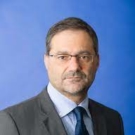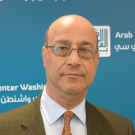Speakers

Joseph Bahout
Director
Issam Fares Institute, American University of Beirut

Mona Fawaz
Professor of Urban Studies and Planning
American University of Beirut

Alia Moubayed
Economist specializing in the MENA region

Sara El-Yafi
Public Policy Consultant and Political Activist
Moderator
Event Summary
On August 19, 2020, Arab Center Washington DC (ACW) held a webinar on the theme, “Lebanon after the Beirut Explosion: Overcoming Multiple Crises.” Moderated by ACW Director of Research and Analysis Imad Harb, the discussion featured five experts on the current crisis in Lebanon, with some actively engaged on the ground. The speakers were Mona Fawaz, professor of Urban Studies and Planning at the American University of Beirut (AUB); Patricia Karam, regional director of the Middle East North Africa (MENA) division at the International Republican Institute; Joseph Bahout, nonresident scholar at the Carnegie Endowment for International Peace’s Middle East Center and the incoming director of the Issam Fares Institute at AUB; Sara El-Yafi, a public policy consultant and political activist; and Alia Moubayed, an economist specializing in the MENA region. Harb posed a number of questions to the panelists and their answers and major points are summarized below.
Mona Fawaz addressed the failure of the Lebanese political system, which was clearly exposed by the explosion, saying that the country has been unable to deal with the calamity, even now two weeks after the event. She said people continue to ask, how is it that these explosives were stored for so many years in a residential neighborhood? Fawaz said that despite the solidarity at present, the blast shows how much sectarianism is entrenched in Lebanon; there is finger pointing and many accusations, reflecting the fragility of the country at this time.
Fawaz lamented that “we don’t have a workable theory of change in politics” in Lebanon. Much work is being done by civil society in the form of nongovernmental organizations, university groups, unions, youth, and organized syndicates in the neighborhoods; many are bringing years of experience in recovery, rebuilding, and relief to the table. Fawaz noted that the Lebanese people are hopeful and unified in their ability to verbally denounce the way the country is governed and run by a criminal class. The question that remains, she said, is how Lebanese society can advance and formulate its own vision if the policies of this class are not disrupted and changed.
As for ending the confessional system in Lebanon, Fawaz asserted that this is a bottom-up process highlighted by the protests that started in October 2019. She noted that the Lebanese realize they need to end sectarianism, clientelism, and the rentier economy. Finally, Fawaz said that engaging people on a nonsectarian platform strengthens the urban-based movement and empowers locally based campaigns.
Patricia Karam argued that the developments after the Beirut port blast are linked with Lebanon’s history of conflict and reinforce the corruption and quest for self-preservation of all the actors. Those who are asked to make reforms are those who are to blame, she said. The confluence of the people’s uprising, economic crisis, coronavirus pandemic, and explosion has brought everything to a head. Lebanese civil society responded to this situation by forming solidarity networks to contest the kleptocracy of the political elite; the opposition has accused the regime of criminal negligence for the explosion, Karam added.
Karam noted that although civil society and the NGOs have played an important role, they have not been effective mainly because of a lack of capacity; given the existing imbalance of power, civil society groups cannot force the radical transformation they want. The movement needs to build an organizational structure and produce a strategy and platform. For its part, the government must strive to foster trust in a post-disaster recovery; in some ways, Karam continued, Lebanon needs a new a social contract to deal with the long-standing and unaddressed legacies of abuse by the political system. She asked, how can the Lebanese imagine a future that is different?
The role of the international community is critical, Karam said, especially since Lebanon has been subverted and controlled by outside patrons who have historically leveraged the country’s economic collapse and, now, this catastrophe. So far, the response has been limited to immediate aid, and even this assistance is being leveraged for political gain, she added. Can the government overcome the greed and dysfunction and embark on a path of real change? Karam recommended that the international community and the United States pursue a principled approach that conditions aid to reform in Lebanon. Further, an independent international investigation is important to initiate, she said, as well as to forge linkages between the international community and Lebanese civil society.
Joe Bahout stated that the blast represents a “condensation” of decades-long suffering in Lebanon: it reveals the utmost negligence and shortcomings of public authorities. It also underlines the depth of defiance of the government and elites and the enormous gap between the citizens and the state. In his view, although civil society actors are to be saluted for all their work, their level of questioning of accountability is very disappointing; he said that if, after a catastrophe of this scale, nothing changes in Lebanon, then “I think we can go toward full despair.”
Bahout asserted that Hezbollah is an absolute impediment to any reform in Lebanon, adding that it is not just Hezbollah that benefits from the intricate and incestuous relations between Syrian tutelage in the country and the political elite. Hezbollah is one of many problematic actors and factors. But, he argued, even if Hezbollah disappears, not much would change because of the inherent corruption in governance and public policy. The huge and tricky fundamental question is about the survivability of the Lebanese state and the polity at large. He picked up on Fawaz’s question regarding the theory of change and posited that three actors need to work together: the state, the society (whether conceived as civil or communitarian), and the international community.
Lebanese society must be organized in order to pressure state institutions to change, Bahout said. He added that the Lebanese must be cognizant of the volatile regional dynamics as they will suffer the effects of the US-Iran impasse and its vicissitudes. If Iran is weakened, he said, then Hezbollah is weakened as a regional actor. No one knows what is happening inside Hezbollah or whether its Syria adventure has weakened or strengthened its military capacity, Bahout added. What is important to address is the effect of the group in a way that mitigates or decreases the risks of potential violence in the country.
Sara El-Yafi spoke about the protest movement in Lebanon today, saying that although it does not represent all Lebanese, it brings to the fore those who are anti-oligarchy, with “communists and capitalists standing shoulder to shoulder” and demanding the resignation of the corrupt political elites. The movement consists of pluralistic nonsectarian groupings. She suggested that one can view the protesters in two ways: those holding signs and chanting slogans and getting beaten, and those civilians filling the role of the state—an act she described as “the loudest form of protest.” Examples are people donating personal resources despite the dire economic situation, youth working to clean streets, and people peacefully demonstrating for the most basic rights, donating blood and services, and opening their doors to the needy.
The regime, she said, stopped foreign and international aid from saving the actual victims, did nothing to help the survivors under the rubble, and even used buckshot bullets on protesters. Lebanese protests are no longer for rights, she added, but are an ethical and moral battle against a regime that is not only lazy, corrupt, and failed, but one that is inherently “criminal, lawless, and felonious.” In fact, the oligarchy is scared of the people’s mobilization, she added.
El-Yafi said that everyone knew about the ammonium nitrate stored at the port, though all levels of government claim that they did not have the salahiyyat, jurisdiction or authority, to deal with the explosive substance, abdicating all responsibility. She further explained that there is irrefutable evidence that has not been highlighted by the majority of local and international media about whether the ammonium nitrate was really meant for agricultural purposes and if it was deliberately sent to Beirut. She stated that, in her view, there is a very high chance that the explosion resulted from an attack, one that will require a thorough international investigation.
Alia Moubayed explained that the Lebanese economy today is reeling under a multitude of challenges. The developing financial crisis and meltdown that unraveled in October 2019 was exacerbated by the coronavirus pandemic and lockdown, the ensuing breakdown of tourism and commerce, and now the devastating explosion that has added a profound humanitarian crisis. Lebanon’s financial model, she said, was unsustainable and costly for its own people. Unlike past episodes of warlike destruction that still left a functioning banking sector in the country, the current crisis is unfolding against a complete financial breakdown. What permeates all these crises, Moubayed said, is an irresponsible kleptocratic and corrupt class that has overtaken the Lebanese state.
Moubayed added that there has been a rapid deterioration of the quality of institutions; for example, only a handful of economists now work in the government. Indeed, there is a serious lack of economic coordination as well as internal disagreement on how to safeguard the economy and the interests of citizens, coupled with an incapacity to formulate policy, all of which have resulted in criminal negligence and what she called “deepened deficits of trust” between citizens and the state. Further, the web of interests in the Lebanese banking system has fostered a lack of accountability, putting it “in bed with the politicians,” she argued. The government’s ability to manage economic policy going forward is simply not there, Moubayed added. She said that this has serious implications for Lebanon as it tries to build confidence in the international community, which has grown wary of the Lebanese government’s ability to address these problems.
One must first attend to immediate needs and then address more structural transformations in order to reconstruct the economic model, Moubayed continued. What is needed for Lebanon now, she said, is a large package of international support that can sustain a home-grown reform program designed and monitored by the Lebanese people themselves. In addition, Lebanon requires an IMF intervention to support a program that lowers the country’s debt burden; without such debt and financial sector restructuring, the country cannot build a very strong social compact with a proactive market and effective social policies. The worst-case scenario, she said, would be a state that relies only on humanitarian assistance; such aid is only a minor part of Lebanon’s needs, Moubayed said. Besides, a subsistence scenario is very dangerous: it pushes people to leave and migrate, and the flight of capital out of the country erodes its ability to recover and leaves it unable to pursue meaningful change.


